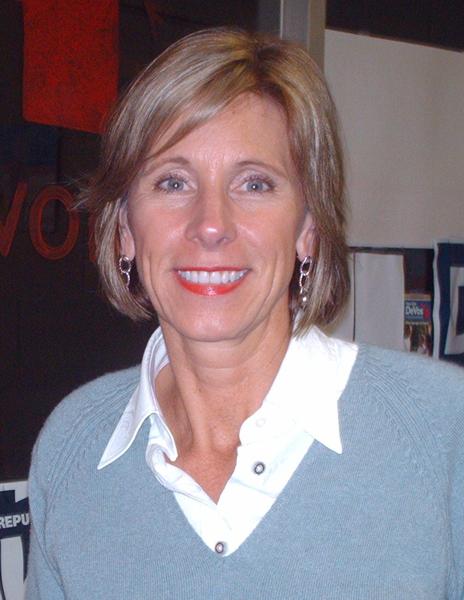Faculty and experts say that uncertainty about the new Secretary of Education’s effects on higher education could result in speculation of policies that may never happen.
After U.S. President-elect Donald Trump nominated Betsy DeVos to the nation’s highest education position last week, universities’ leaders found themselves on the cusp of a potential sharp turn away from President Barack Obama’s higher education initiatives, like student loan repayment and tuition-free college. Because little is known about DeVos’ higher education views, educators and policymakers may find themselves questioning what the next administration will bring.
DeVos has most recently served as the chairwoman of the American Federation for Children and as a trustee of the American Enterprise Institute but has made few public statements about her positions on higher education. DeVos is the former chairwoman of the Michigan Republican Party and has been called a “principled conservative” by Frederick M. Hess of AEI.
GW faculty and experts say that DeVos’ lack of transparency on potential education policies means that reforms could be slowed down because having a pre-set agenda can make policies change faster.
Michael Feuer, the dean of the Graduate School of Education and Human Development, said he is unsure what policies DeVos will enact but is concerned that Trump’s “fundamentally bigoted” rhetoric will be evident in education policies.
“As an institution dedicated to academic freedom and to the ideal of inclusivity in education, we need to be committed to our vision and our mission,” Feuer said.
Feuer said he is particularly concerned about DeVos’ support of charter schools and voucher programs, which he said could affect the types of students from across the U.S. that GW could admit. DeVos worked to prevent more regulation of charter schools in Michigan.
Charter schools are intended as alternatives to poorly performing public schools in areas where mostly low-income families live. Voucher programs work with these charter schools by using the amount of money that would have been spent on a student at a public school for the student’s charter school tuition. DeVos has been a vocal supporter of both, which Feuer said could be problematic for education policy because they have proven ineffective.
“The kinds of privatization solutions that she has favored up until now have ultimately proven to be unsuccessful and in some cases have caused considerably more harm than good,” Feuer said.
Charter schools have been criticized for having limited oversight from the government and taking away money from public schools in low-income communities of color. With GW’s interest in increasing the diversity of their applicant pool, these communities may have more students who struggle to gain admittance or be adequately prepared for coursework.
But Feuer said that the reauthorization of the Elementary and Secondary Education Act in 2015 shifted more power to states and districts by allowing states to expand quality standards for their schools and create teacher evaluations.
Feuer said he expects the Trump administration, including DeVos, to be less involved in federal civil rights compliance. For GW and other universities, that could mean less of an emphasis on Title IX compliance and the way sexual assault is handled. GW has committed to policies like required education on sexual assault and victim confidentiality that may not be priorities for DeVos.
Daniel Klasik, an assistant professor of higher education administration, said GSEHD researchers are especially interested in Trump’s and DeVos’ impact on education research money.
“Many faculty members in GSEHD receive research funding,” Klasik said. “A reduction in funding available could be a big blow to the work we do.”
Klasik said he was not very worried about higher education affordability because Pell Grants, direct aid from the federal government to colleges that cover tuition costs for low-income students, are popular and bipartisan. About 15 percent of this year’s freshman class received Pell funding.
Klasik said even though Trump has not been supportive of free college – a concept trumpeted by former candidates Sen. Bernie Sanders, I-Vt., and Hillary Clinton – GW could make itself more affordable.
“It does not mean that colleges like GW cannot pursue policies that reduce the cost of college for their students on their own,” Klasik said. “It just means that the federal government won’t be leading the way.”
John Banzhaf, a public interest law professor, said Title IX-associated cases, specifically lack of due process in rape cases, was of particular concern to the Foundation for Individual Rights in Education, which DeVos has donated to. He said the Republican party in general has been dissatisfied with the treatment of sexual assault cases.
“You can’t focus simply on Betsy DeVos,” Banzhaf said. “You also have to look at some of the other players.”
Banzhaf added that because Trump doesn’t believe in climate change, GW could receive less government funding for sustainability research.
Robert Kelchen, an assistant professor of higher education at Seton Hall University, said Obama’s agenda for higher education, like providing free community college and changing student loan repayment, will likely be disregarded by the next administration. But Trump is not a typical conservative and may surprise higher education leaders with policies on affordability, Kelchen said.
Kelchen said Trump’s pick for under secretary of education could be as important as his choice of DeVos, as the person who fills that position often handles higher education policies.
Current Under Secretary of Education Ted Mitchell held administrative positions at the University of California at Los Angeles and Occidental College, while former Secretary of Education Arne Duncan had limited knowledge of higher education and leaned on suggestions from his under secretary.
“We don’t know how much Trump is willing to be involved in education,” Kelchen said.







